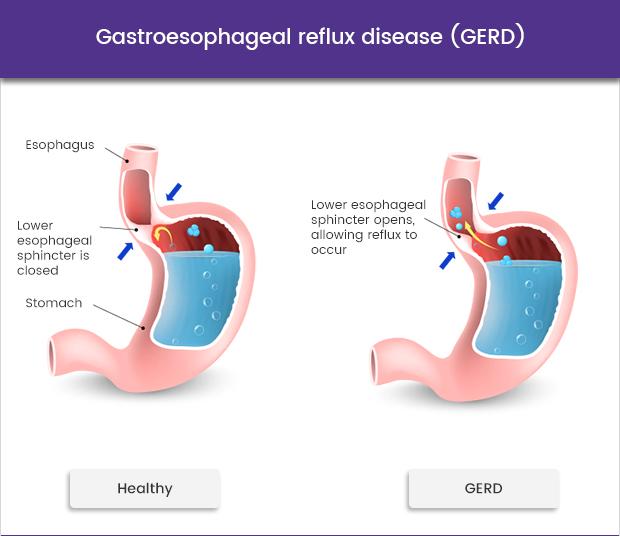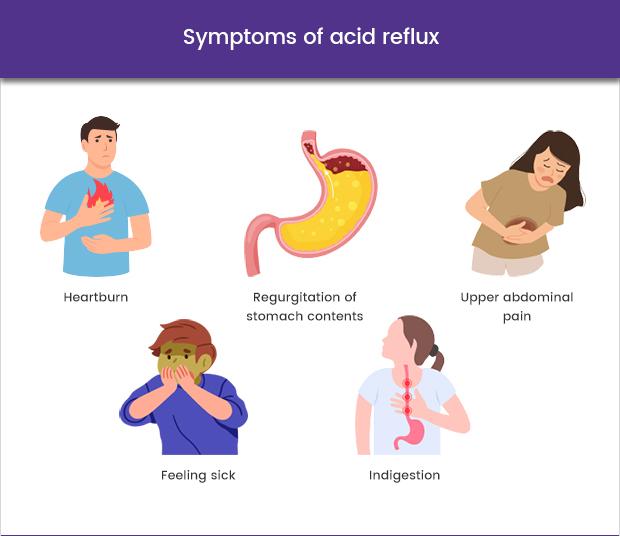- Acid Reflux
Acid reflux
Alleviate acid reflux symptoms with soothing solutions
Acid reflux is a common condition affecting the digestive tract. It occurs when stomach acid flows backwards into the esophagus, causing a burning sensation commonly known as heartburn.
This condition can cause discomfort, affect your lifestyle and in severe cases, may cause permanent damage or complications.
Learn more about the causes, triggers and preventive measures to manage this condition effectively.

Medically reviewed by Dr. Adrian Rawlinson
Written by our editorial team Last reviewed 25 January 2024
Treatments

- Effective acid reflux treatment
- Starts working within an hour
- Effects last for up to 72 hours
Acid Reflux explained
What is acid reflux?
Acid reflux is a condition where the stomach acid travels up into the esophagus (the tube connecting your mouth and stomach). This can irritate the lining of your esophagus.
Almost everyone has experienced an episode of acid reflux before. Occasional acid reflux is uncomfortable, but it’s not a disease. However, if the condition is severe or happens often, it is known as gastroesophageal reflux disease (GERD).
GERD is estimated to affect about 20% of people in the United States.
Heartburn vs acid reflux
People may mix the terms ‘heartburn’ and ‘acid reflux’ however, heartburn is one of the symptoms of acid reflux.
Despite its name, heartburn does not have anything to do with the heart. People with heartburn experience a burning sensation in the chest, usually behind the breastbone. This occurs after eating and can made worse by lying down or bending over.
What causes acid reflux?
When you swallow, a muscle called the lower esophageal sphincter (LES) relaxes to let food and liquid into your stomach.

This sphincter then closes again to keep these substances inside your stomach and prevent them from coming back up. After this, the stomach releases strong acid which breaks down food and kills bacteria.
If this sphincter weakens or relaxes too often, your stomach acid can come back up into your esophagus. This is known as acid reflux.
What are the risk factors?
Acid reflux can affect anyone, some risk factors for experiencing acid reflux include:
- Obesity: Being overweight or obese is thought to put extra pressure on your abdomen, which may affect your LES.
- Smoking: Tobacco smoke can cause the muscles of the LES to relax, which allows for reflux. Smoking also triggers coughing, which opens your LES.
- Certain medications: Asthma medicines, calcium channel blockers, some antidepressants, and nonsteroidal anti-inflammatory drugs can contribute to GERD.
- Pregnancy: Many women experience heartburn during the later stages of pregnancy, as the womb pushes up against the stomach.
- Hiatal hernia: This occurs when the upper part of the stomach pushes into the chest cavity through the diaphragm, potentially leading to acid reflux.
Foods, drinks and eating habits may not be enough to cause acid reflux alone, but they can contribute to it. Some factors known to aggravate acid reflux include:
- Eating large meals
- Eating late at night (before bed)
- Lying down within 2-3 hours of eating a meal
- Eating certain foods (triggers) such as spicy, acidic, fatty or fried foods
- Beverages (such as alcohol or caffeine)
Management & treatment
What are the symptoms of acid reflux?
Acid reflux commonly causes heartburn, as previously mentioned. When the stomach contents come back up into the throat and mouth you may experience an unpleasant sour, bitter or acidic taste.
Other common symptoms include upper abdominal pain, feeling sick (nausea) and indigestion.

How is acid reflux diagnosed?
To make a diagnosis of GERD, your doctor will take your medical history and do a physical exam. The following tests are also used to help confirm the diagnosis or to check for any complications:
1. Upper gastrointestinal (GI) endoscopy
This involves having an endoscope (a flexible tube with a small camera and light at one end) passed through your mouth and down into your stomach. This helps the doctor to see inside your esophagus and stomach and examine the lining of your GI tract.
During this process, the doctor may do a biopsy. This is the removal of small pieces of stomach tissue for examination. This sample will be sent away to be looked at under a microscope.
2. pH monitoring
This is a test to detect if there is any stomach acid in the esophagus. It involves inserting a small, thin tube through your mouth or nose. The tube has a sensor at one end, which measures your acid level.
3. Esophageal manometry
In this test, a flexible tube is passed through your nose into your esophagus to measure the movement of muscles here.
What are some complications of acid reflux?
If the stomach acid comes into your throat often it can cause irritation and inflammation.
If left untreated it can cause complications such as:
- Esophagitis: This is inflammation of the tissue in the esophagus. Bleeding and ulcers may also be seen, which can cause pain and difficulty swallowing.
- Esophageal stricture: This is when the esophagus narrows due to damage from scar tissue. This can lead to trouble swallowing.
- Barrett’s esophagus: In this condition, there are changes in the tissue lining the esophagus. This condition can increase the risk of developing esophageal cancer.
What are some acid reflux treatments?
Antacids
Antacids contain ingredients such as aluminum, calcium, magnesium, or sodium bicarbonate which counteract the stomach acid and make its pH more neutral.
They are fast-acting and provide rapid relief of mild acid reflux symptoms. Some may contain alginates, which form a ‘raft-like’ structure on top of your stomach contents. This stops food and acid from going up into the throat.
These medicines may be prescribed or bought over the counter. They may interact with some medicines, so it’s best to speak to your healthcare provider to see if they are right for you.
H2-receptor blockers
Medicines such as Famotidine and Cimetidine reduce the amount of acid made by your stomach to provide relief of GERD symptoms. They do this by blocking the chemical that signals your body to produce stomach acid. They don’t act as quickly as antacids but may provide longer relief.
Proton-pump inhibitors (PPIs)
Similar to H2-receptor blockers, PPIs reduce stomach acid production however, they are stronger acid blockers and also help to heal your esophagus. They are recommended for severe GERD symptoms. Some commonly prescribed PPIs include Omeprazole and Lansoprazole.
Here at SpeedyHealth, our doctors can prescribe prescription-strength PPIs for acid reflux symptoms.
Surgery
Your doctor may suggest surgery if your symptoms don’t improve with lifestyle changes and medicines. However, with surgery, there is a risk of developing complications.
Common surgical procedures involve the surgeon wrapping the top of your stomach around the lower part of the esophagus to tighten the muscle and help prevent reflux. In most cases this leads to long-term improvement of GERD symptoms.
If you have GERD and are obese, weight-loss surgery, also called bariatric surgery, may be an option to consider. This type of surgery can help you lose weight and improve GERD symptoms.
Next steps
How can acid reflux be prevented?
Most people can prevent symptoms of acid reflux by making simple lifestyle changes.
Some people find that some foods or drinks trigger their symptoms or make them worse. There are certain foods to avoid with acid reflux, these include:
- Fatty foods
- Spicy foods
- Acidic foods such as citrus fruits and tomatoes
- Chocolate
- Fizzy drinks and acidic juices
- Caffeine
- Alcoholic drinks
You can also make lifestyle changes such as:
- Improving your posture
- Maintaining a healthy weight
- Quitting smoking
- Limiting alcohol
- Avoiding eating late at night
- Eating smaller meals
- Wearing loose-fitting clothes
Can I buy acid reflux medication online?
Here at SpeedyHealth, you can now get safe and effective treatment for acid reflux online. This service is convenient and you can do it from the comfort of your home.
Our board-licensed doctors will review your completed medical form, to determine what the best treatment option is for you. If they approve, the medication will be sent straight to your door.
Order anytime, anywhere.




See what our customers have to say
See why our customers rated our service 4.5 stars out of 5 on Trustpilot.
Excellent!
4.5NWS , 12 Jan
Always efficient and timely
A N , 07 Jan
You were dependable with product performance and administrative and shipping functions.
Dale P , 07 Jan
SpeedyHealth has been a great experience from start to finish. The site is easy to use, the information is clear, and everything loads fast. I really like how straightforward it is to find what I need without digging through a bunch of pages. Their customer support is quick and helpful too, which makes a big difference. If you want a smooth, stress‑free way to handle your health needs online, SpeedyHealth.com is definitely worth checking out.
James W , 05 Jan
The way you double check and make sure that I’m having no health problems. Also, you make it very clear that I should check with you if I have any type of situation at all that does not seem right on top of all of that my orders come probably I appreciate you. Thank you so very much.
John S , 30 Dec
Shipment time was reasonable. I've tried one pill for a masturbation session. Moderately successful.
Richard S , 29 Dec
Timely delivery.
